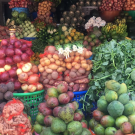The FAO Sustainable Food Value Chain (SFVC) framework guided this value chain analysis. The elements of the framework provide a market-oriented and systems-based approach for measuring, analyzing, and improving the performance of food value chains (FVCs) in ways that help ensure their economic, social, and environmental sustainability. The framework helped identify secondary actors such as input suppliers and providers of support activities, as well as the wider enabling environment, including policy regulations, sociocultural norms, and organizations. A multistage sampling approach was used to select the sampling areas for the four selected crops. The first stage of the sampling was based on the predetermined project zones of influence (i.e., the regions). The second stage involved the selection of the districts within the regions based on the cropping data obtained from the Ministry of Food and Agriculture (MoFA). In each region, a minimum of three districts were sampled based on the production and marketing data. For each district, a total of 80 farmers and traders were sampled for the survey. This resulted in a sample size of 720. Primary and secondary data were collected for the VCA. Key informant interviews (KIIs), focus group discussions (FGDs), and survey protocols were developed to collect data from the different value chain actors.
Deffor, E. (2024) Value Chain Analysis for Selected Indigenous Vegetables in Ghana. Feed the Future Innovation Lab for Horticulture

